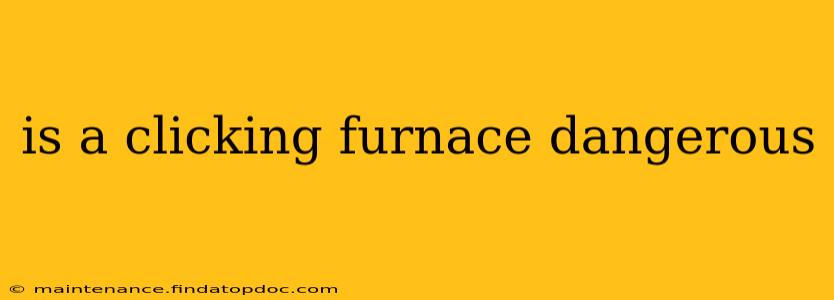Is a Clicking Furnace Dangerous? Understanding Furnace Noises and Safety
A clicking sound emanating from your furnace can be unsettling. While not always a sign of immediate danger, it's crucial to understand the potential causes and the steps to take to ensure your safety and the longevity of your heating system. Ignoring unusual noises can lead to more significant problems down the line, potentially resulting in costly repairs or even hazardous situations.
This article will delve into the reasons why your furnace might be clicking, explore the potential dangers, and offer guidance on what to do if you hear this concerning sound.
What Causes a Clicking Noise in a Furnace?
Several issues can cause a clicking sound in your furnace. These include:
-
Electrical Issues: A clicking sound can indicate a problem with the electrical components, such as the igniter, blower motor, or control board. These components often produce a distinct clicking sound as they attempt to engage or disengage. Faulty wiring or loose connections can also contribute to this clicking.
-
Gas Valve Problems: The gas valve is responsible for controlling the flow of gas to the burner. A clicking sound from the gas valve could suggest that it's malfunctioning, struggling to open or close correctly. This can lead to incomplete combustion, carbon monoxide buildup, and potential fire hazards.
-
Blower Motor Issues: Though less common, a worn-out or failing blower motor can also click. The motor might be struggling to start, resulting in a series of clicks as it tries to engage.
-
Igniter Problems: The igniter is responsible for igniting the gas. If the igniter is faulty, it may produce a clicking sound as it attempts to spark, but fails to ignite the gas. This situation usually leads to the furnace shutting down.
-
Loose Components: Sometimes, the clicking sound might be caused by a loose component within the furnace. Internal parts vibrating against each other can create clicking noises, though these are usually less concerning than the issues described above.
Is a Clicking Furnace a Fire Hazard?
A clicking furnace can potentially be a fire hazard, especially if the clicking is related to gas valve or electrical problems. Incomplete combustion, caused by a malfunctioning gas valve, can lead to the buildup of combustible gases within the furnace. This, in turn, can result in a fire or explosion. Similarly, electrical shorts or arcing within the furnace, indicated by persistent clicking, can also ignite combustible materials and cause a fire.
Is a Clicking Furnace Producing Carbon Monoxide?
Yes, a malfunctioning furnace, particularly one exhibiting a clicking sound related to gas issues, can produce dangerous levels of carbon monoxide (CO). Carbon monoxide is an odorless, colorless, and highly toxic gas. Incomplete combustion, as mentioned earlier, is a primary cause of CO buildup. Symptoms of CO poisoning include headache, dizziness, nausea, and weakness. If you suspect CO poisoning, immediately leave the premises and contact emergency services.
What Should I Do If My Furnace Is Clicking?
Hearing a clicking sound from your furnace is a clear indication that something is not right. Do not attempt to repair the furnace yourself. This is especially important if the clicking is accompanied by other unusual sounds, smells, or behaviors. Instead:
- Turn off the furnace: Immediately shut off the power supply to the furnace to prevent further problems and potential hazards.
- Contact a qualified HVAC technician: Schedule a service appointment with a qualified technician to diagnose the problem and perform the necessary repairs. A professional will have the expertise and tools to safely identify and address the issue, ensuring your safety and the proper functioning of your furnace.
- Install and monitor carbon monoxide detectors: CO detectors are crucial for detecting potentially lethal levels of carbon monoxide. Install detectors on every level of your home and regularly test them to ensure they are functioning correctly.
In summary: While a clicking sound from your furnace might not always be an immediate emergency, it shouldn't be ignored. The potential for fire hazards and carbon monoxide poisoning warrants immediate attention from a qualified professional. Prioritizing safety and seeking professional help will prevent costly repairs and protect you and your family.
